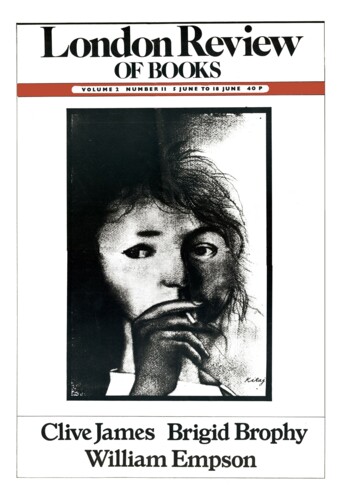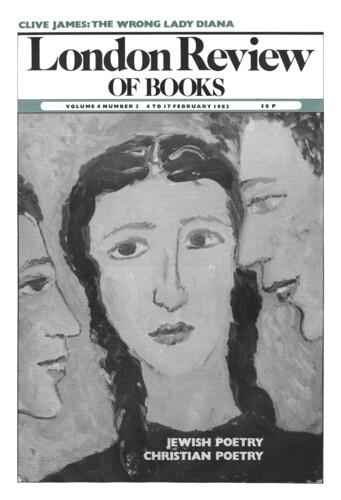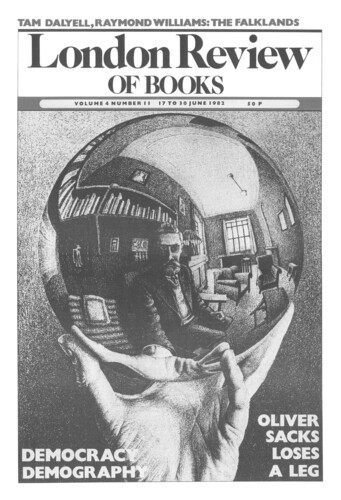Gabriel Josipovici
Gabriel Josipovici is an emeritus professor at the University of Sussex. His books include The Lessons of Modernism and Forgetting, as well as many novels, including Contre-Jour, Goldberg: Variations and Hotel Andromeda.
I hate it, I hate it, I hate it
3 December 1981
Roads to Rome
4 February 1982
Faculty at War
17 June 1982
Out of Egypt
3 July 1986
Pieces about Gabriel Josipovici in the LRB
Buckets of Empathy
James Wood, 30 March 2000
If innocence were a family business, a terraced saga like Buddenbrooks, our age would be the sickly generation that abandons the firm and takes up the piano. We would seem to have nothing left in...
Bible Stories
John Barton, 16 February 1989
Hegel, says Kierkegaard, presents us with history seen in terms of its ends, as a story which we, from our privileged vantage-point, can decipher. But, says Kierkegaard, that leaves out of...
Yak Sandwiches
Christopher Burns, 31 March 1988
John Murray’s fiction has always seemed to arise directly from the circumstances of his own life. At first, his work concentrated on his childhood and adolescence among the tiny, depressed...
Afro-Fictions
Graham Hough, 3 July 1986
Three African writers, from very different parts of the continent – Saro-Wiwa from Nigeria, Ndebele from South Africa, Macgoye from Kenya. My ignorance of all three regions being deep and...
The Great Exhibition
John Sutherland, 6 September 1984
A prefatory note testifies that Empire of the Sun draws on its author’s observations as a young boy swept up by the Japanese capture of Shanghai, and his subsequent internment in Lunghua...
Malcolm Bowie on the shimmer of transcendence
Malcolm Bowie, 5 July 1984
As I begin to write this, innumerable other reviews are being born. Some are being word-processed in paper-free offices, others handwritten in the Club lounges of intercontinental jets and others...
Mortal Scripts
Christopher Norris, 21 April 1983
In the present climate of polemical exchange one may doubt whether Gabriel Josipovici would take very kindly to being enlisted on the side of ‘literary theory’. Though his essays make...
Words about Music
Hans Keller, 30 December 1982
My fairly extensive – and, analytically, intensive – writings about Stravinsky confine themselves to his music and the psychology of his creativity – to the products and the...
On the Verge of Collapse
John Sturrock, 19 August 1982
The Siren’s Song is the first chance English readers have had to experience Maurice Blanchot. If it is the case, as Gabriel Josipovici pre-emptively asserts in his introduction, that...
Doomed
Graham Hough, 3 December 1981
It is a curious thing that while so many critics are busy telling each other that literature is a linguistic game, that novels are purely formal structures and that their pretensions to represent...
Character References
Robert Taubman, 15 May 1980
‘Yvonne dear,’ his Aunt said, ‘won’t you do the introduction?’ ‘This is Nancy,’ Yvonne said. ‘This is Andy. This is Mildred. This is George....
Read anywhere with the London Review of Books app, available now from the App Store for Apple devices, Google Play for Android devices and Amazon for your Kindle Fire.
Sign up to our newsletter
For highlights from the latest issue, our archive and the blog, as well as news, events and exclusive promotions.





